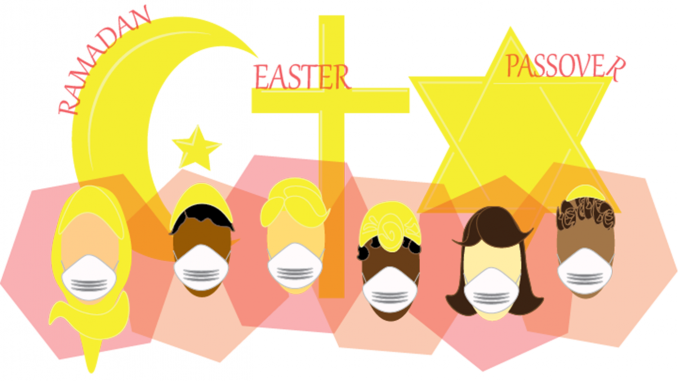
COVID-19 changed Lee Wilcox’s life.
As the virus spread across Philadelphia, the daycare she worked at shut down, her year of student teaching was cut short and she made the adjustment to online learning as Temple University suspended in-person operations in the spring.
When she sat down to reflect on these changes, Wilcox, a senior early childhood education major, began tuning in to Catholic masses that were streaming on YouTube.
“Because of this whole virus thing, I’ve found faith again,” Wilcox said. “This is time to reconnect with God.”
Wilcox is one of the many religious Americans who were impacted by COVID-19, according to an April report by the Pew Research Center. The pandemic has forced the cancelation of in-person religious services and the loss of traditional gatherings for religious holidays, according to the report. But for some religious students at Temple, it did not mean a loss of faith.
Carly Goldberg, a senior communication studies major who practices Reform Judaism, sees parallels between her faith and the pandemic. She joked with her parents that they’re living through a modern version of Passover, a time in ancient Jewish history when 10 plagues descended upon Egypt.
This humor is a hallmark of her faith that helps her during this time, Goldberg said.
“I think something that’s very much valued in Judaism is perseverance, especially perseverance through tough times, and being able to look at that value of perseverance and have enough of a sense of humor about it,” she added.
Anisa Ara, a 2020 business administration alumna, has also leaned on the values of her faith during the pandemic. Ara, who practices Sunni Islam, said her faith gives her hope because of the power of prayer.
“Religious practice is between you and God, and I can ask [God] for forgiveness and I can ask [God] for help, and at this time, a lot of people need it,” Ara said.
Although Ara continues her prayers, she misses being able to gather for Jum’ah, also known as the Friday prayer. This is when Muslims come together to worship, followed by a sermon, or khutbah, from an imam, or prayer leader, according to Harvard University’s Pluralism Project.
“Personally for me, it’s very heartwarming to hear [the sermon], because they provide history, they provide basic human things that we should be following but we almost always forget to do,” Ara said.
Ara also misses Friday prayers because they gave her a sense of community, something that has been significant for her personal journey in her faith. She found her sense of Islam through spending time with fellow Muslims her own age during her time at Temple.
Her faith was also influenced by the community found at her mosque, where she would hear the Quran, the holy text of the Islamic faith, read in its traditional Arabic. Since many Muslims’ first language isn’t Arabic, having a teacher read the text to people is important, Ara said.
When in-person services were suspended because of COVID-19, Ara and her community lost immediate access to those teachers. Ara, like Wilcox, now streams religious services on YouTube and Facebook Live.
Goldberg, a member of Hillel at Temple University, a Jewish student organization, feels that maintaining faith communities, even virtually, is a way to help people who feel isolated during COVID-19.
“Prayer isn’t a super big part of Judaism for me, but more so just having that culture and that community as a resource during difficult times, definitely makes me feel less alone,” Goldberg said.
For Wilcox, reconnecting with her faith community online and spending more time in prayer during the pandemic has helped her feel more connected with people at a time when she can’t do so physically, she said.
Wilcox felt empowered to persevere through the changes in her life after attending a global virtual mass held by Pope Francis, the leader of the Catholic church. During the mass, Wilcox and other Catholics prayed using a rosary, or prayer beads, to ask God for help for those suffering from COVID-19 and for all frontline workers.
“More people started to join, and it just felt like I was not alone through this whole journey and that I had people with me, praying about this, making sure that we’re going to get through this together,” Wilcox said. “It was just so awesome to feel.”



Be the first to comment